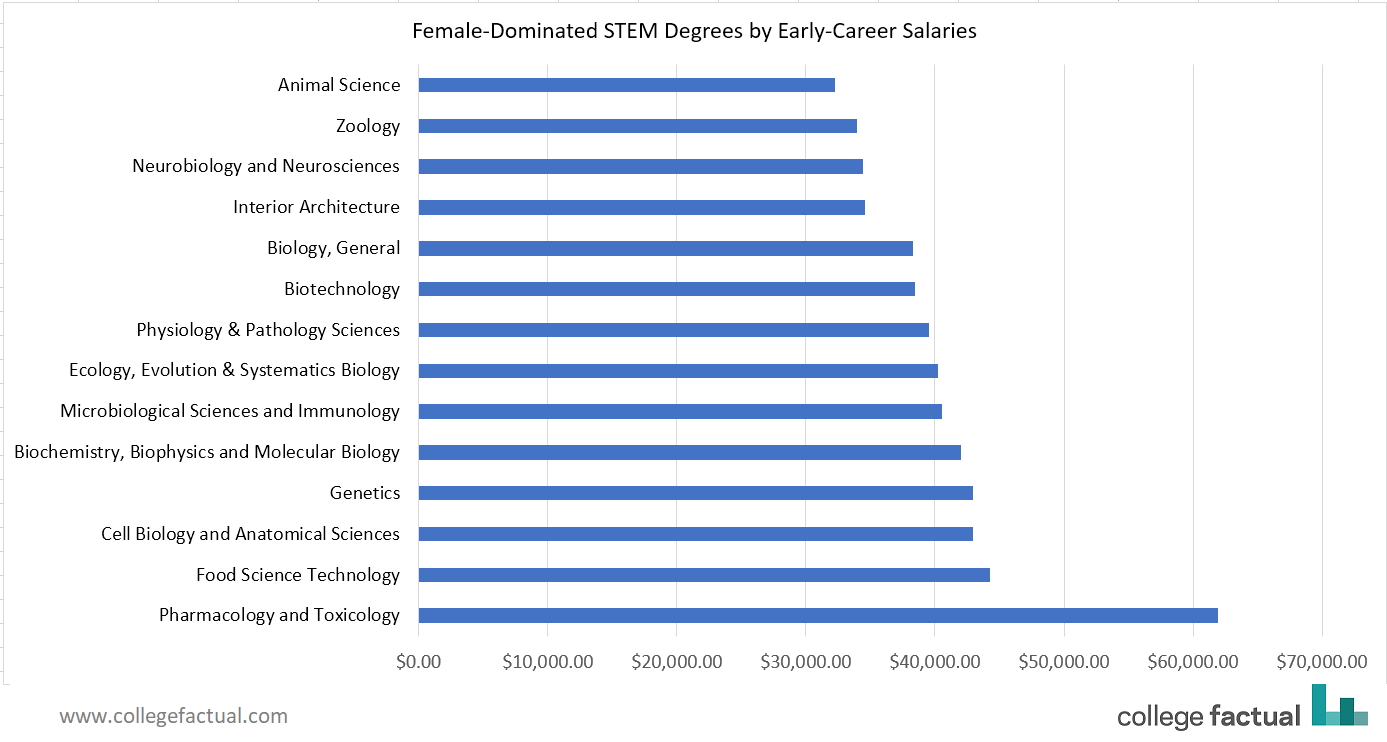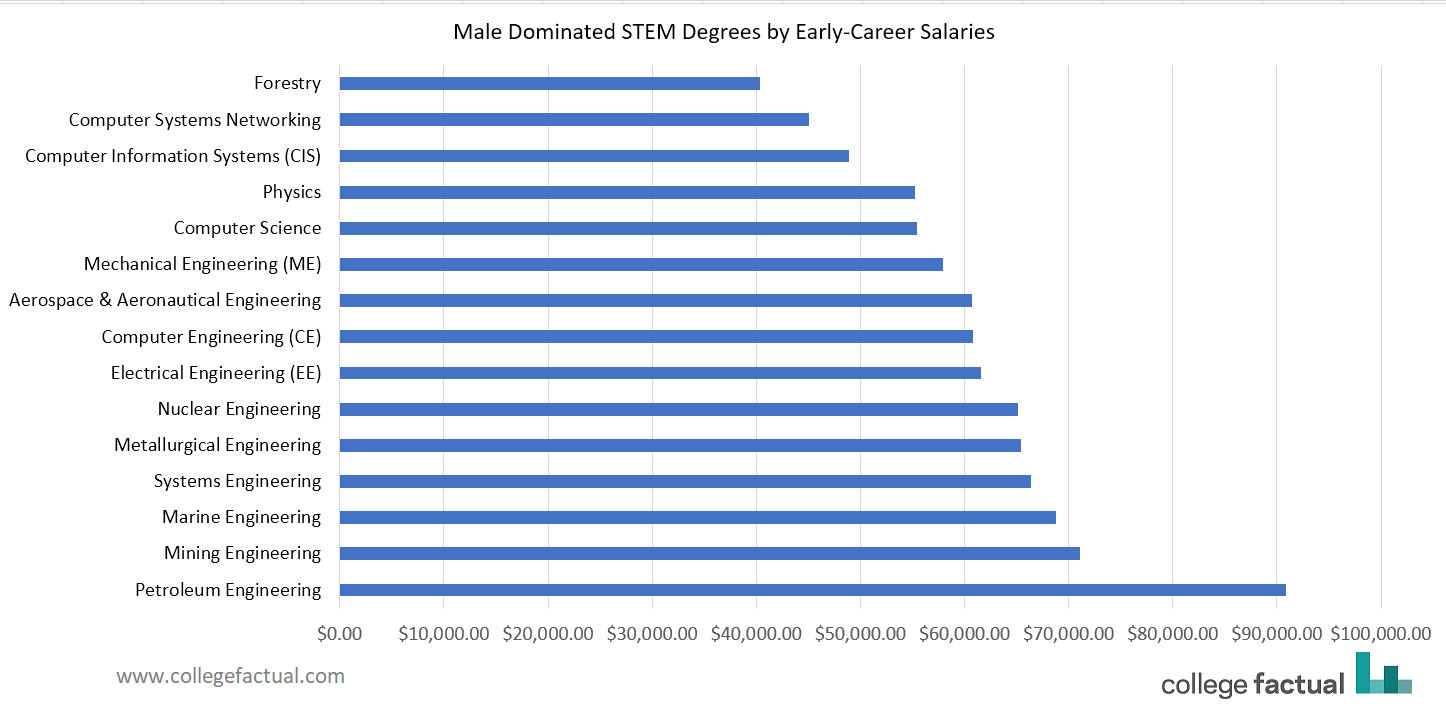STEM degrees lead to careers in science, technology, engineering and other cutting-edge fields. These careers tend to be high-paid and are growing quickly.
According to the Bureau of Labor Statistics, 93 out of 100 STEM occupations have wages above the national average. In addition, STEM occupations have above-average growth in general. This makes STEM in general, but especially jobs relating to computers, particularly good fields to get into.
Many industry leaders, politicians, teachers, and parents are encouraging all students to investigate these fields in college, as STEM degrees present graduates with some of the best opportunities of any college major.
This can be clearly seen by our list of the top 25 highest paid college majors, which is heavily dominated by engineering, computer science, and math-intense majors.
Many are concerned, though, that women are missing out on these lucrative and exciting career options. Microsoft claims that only 6.7% of women graduate college with a STEM degree. We decided to examine the numbers for ourselves.
How Do You Define a STEM Major?
Loosely defined, STEM encompasses all college majors that fall into the categories of science, technology, engineering, and math.
Unfortunately, when it comes to individual majors and fields of study, everyone categorizes STEM a little differently. For the purposes of this article, we’ve included the following fields of study and all the majors contained within them:
- Agriculture & Agriculture Operations
- Architecture & Related Services
- Biological & Biomedical Sciences
- Communications Technologies & Support
- Computer & Information Sciences
- Engineering
- Engineering Technologies
- Mathematics & Statistics
- Natural Resources & Conservation
- Physical Sciences
- Science Technologies / Technicians
We excluded from our list of STEM degrees anything that could be classified as a social science, which includes psychology, as well as degrees that are classified as business or medical.
We tried to pick fields of study that included majors most focused on STEM that were not usually categorized under different fields. This is not meant to be a statement on how worthwhile any degree is to study, or how difficult it is.
Many majors may include science, math or computer classes without being completely focused on them. For example, nursing or cognitive psychology majors will take a lot of science classes, and accounting majors will take a lot of math classes, but all those majors are better represented in different fields and so are not included in our analysis of STEM degrees.
The Numbers
The numbers we found reflect the findings of Microsoft.
Only 7% of women who graduated from college in 2016 earned a degree that could be classified as STEM.
STEM degrees are more popular with men, but still in the minority overall. About 15% of men who graduated in 2016 earned a STEM degree.
The breakdown of STEM graduates in 2016 was 37% female and 63% male.
Data is based on graduation rates from 2016 from the Department of Education.
Which STEM Degrees do Women Choose?
Not all STEM degrees are created equal. Some STEM degrees tend to pay very well right out of college, while some do not, and some tend to require further study to launch a career.
On average, the STEM degrees that women are more likely to pursue are more science-oriented over engineering, math or computers, and tend to be lower paid.
To illustrate this phenomenon, we isolated the 15 STEM degrees where women represent a greater percentage of graduates than, and ranked them by average early-career salary.
There are only 15 STEM majors where women outnumber men. The early career salary for those majors ranges from $32,000 to $62,000.
Compare that to the most male-dominated STEM degrees (just the top 15 of many), and you can easily see who is more likely to earn a high salary after graduation.
The top 15 most male-dominated STEM majors range in early-career salary from $40,000 to over $90,000.
Why are Women Not Choosing STEM?
The gender gap in STEM degrees seems to apply across all races. We found students of Asian descent were more likely to study STEM of all other ethnicities, but even among Asian students men are much more likely to graduate in STEM.
The liklihood of graduating with a STEM degree is fairly consistent accross all ethnicities with the notable exception of Asians, who are more likely to pursue STEM. Yet, the gender gap remains even among Asian men and women.
The data clearly shows that men are more likely to pursue STEM, more likely to pursue engineering specifcially, and more likely to graduate from STEM majors with higher than average salaries.
What we don't know is WHY more women don't study STEM, and why men and women choose the specific degrees that they do.
Here are some of the theories that have been put forth as to why women are falling behind in STEM.
Perception of the field as masculine. One study ironically found that the over-emphasis on recruiting and mentoring women in STEM may help contribute to the stereotypes of the field as being masculine and not a good place for women. The truth is that women are just as successful as men when in the field, just that less of them seem to pursue it for a host of complicated reasons.
Women need more role models in the STEM field. One of the main goals of Microsoft’s campaign, #MakeWhatsNext is to highlight the role women have played in the realm of science and technology and to encourage more representation of women in these fields. The more young girls see other women in these positions, the easier and more appealing it is to envision themselves in those roles.
Introductory classes should be made more welcoming to beginners. Women are less likely to take computer programming in high school and less likely than men to continue with a computer programming degree after taking an introductory class. One study sponsored by the National Science Foundation is looking into ways to make computer science and programming classes more welcoming for women to encourage them to continue their studies.
Women are just pursuing their interests, and it’s not a big deal. Some commenters have suggested that women are less likely to choose tech-oriented jobs due to their own personal interest in other fields. As long as women are earning enough money to pay back their loans and are happy in their chosen profession, do we really need to worry about how many are in STEM?
A few further thoughts
More women than men go to college and graduate from college. So, even though only 7% of women graduate with a STEM degree, 53% of all college graduates were women. Roughly 600,000 more women than men graduated with a bachelor’s degree in 2016.
There are many reasons for the increase of women graduating college. One reason is that men are more likely to be interested in and get paid well for jobs that don’t require a college degree such as construction and manufacturing. Women tend to get paid between 16% and 18% less than men in those fields, according to a Payscale study.
Women without college degrees typically get paid less than men without college degrees, so it makes good logical sense for women to choose a college degree for access to higher paying careers, while for some men it may make more sense to skip the degree and just focus on a career of interest that doesn't require taking on student debt. According to a study from Georgetown University, men with some college and no degree make similar earnings to women with bachelor’s degrees.
What do you think about the gender imbalance in STEM degrees?
Is it a result of women freely choosing among many options, or is there stereotypes and biases that are holding women back from entering these fields?
Do you know which college majors suit you best based on your strengths and interests?





